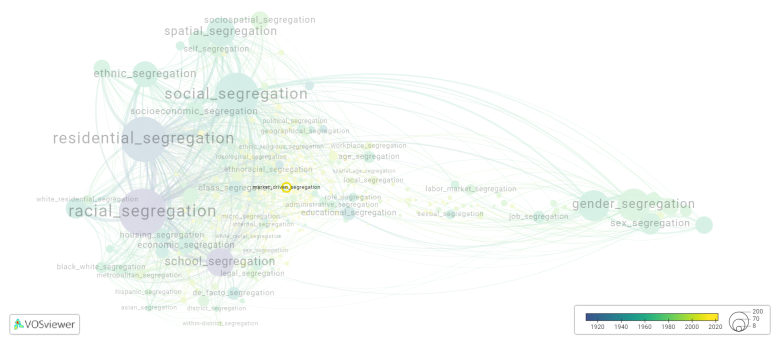Market driven segregation: Difference between revisions
(Creating page) |
(Creating page) |
||
| (4 intermediate revisions by the same user not shown) | |||
| Line 11: | Line 11: | ||
Market-driven segregation can have negative consequences on social cohesion, access to resources, educational opportunities, and overall quality of life for marginalized communities. It can perpetuate inequality, limit social mobility, and reinforce systemic discrimination. Policies and interventions aimed at promoting fair housing practices, addressing income disparities, and improving access to resources can help mitigate market-driven segregation and encourage more inclusive communities. | Market-driven segregation can have negative consequences on social cohesion, access to resources, educational opportunities, and overall quality of life for marginalized communities. It can perpetuate inequality, limit social mobility, and reinforce systemic discrimination. Policies and interventions aimed at promoting fair housing practices, addressing income disparities, and improving access to resources can help mitigate market-driven segregation and encourage more inclusive communities. | ||
==== | ==See also== | ||
==Related segregation forms== | |||
Market driven segregation is frequently discussed in the literature with the following segregation forms: | |||
[[residential segregation]] | |||
[[File:market_driven_segregation.png|780x780px]] | |||
This visualization is based on the study [[Segregation_Wiki:About| The Multidisciplinary Landscape of Segregation Research]]. | |||
For the complete network of interrelated segregation forms, please refer to: | |||
* [https://tinyurl.com/2235lkhw First year of publication] | |||
* [https://tinyurl.com/2d8wg5n3 Louvain clusters] | |||
* [https://tinyurl.com/223udk5r Betweenness centrality] | |||
* [https://tinyurl.com/244d8unz Disciplines in which segregation forms first emerged (Scopus database).] | |||
==References== | ==References== | ||
==Notes== | ==Notes== | ||
<references /> | <references /> | ||
{{NoteAI}} | {{NoteAI}} | ||
==Market | ==Market driven segregation appears in the following literature== | ||
Gong Y., Wei Y. (2022 | Gong Y., Wei Y. (2022). The Transformation of Residential Segregation in the Pearl River Delta, China: A Planning Driven Form. ''SAGE Open'', ''12''(2), -. SAGE Publications Inc..https://doi.org/10.1177/21582440221101053 | ||
Latest revision as of 07:17, 16 October 2024
Date and country of first publication[1][edit | edit source]
2022
China
Definition[edit | edit source]
Market-driven segregation refers to the phenomenon where economic forces and market dynamics contribute to the separation and concentration of different social and ethnic groups in certain areas or neighborhoods. This form of segregation happens when individuals or families with similar incomes, preferences, and backgrounds choose to live in close proximity to others like them, resulting in the creation of homogeneous communities.
Market-driven segregation can occur due to various factors such as housing affordability, market discrimination, and socioeconomic disparities. For example, if housing prices in certain neighborhoods are beyond the financial means of low-income individuals or families, they may be forced to live in economically disadvantaged areas. Similarly, market discrimination, where certain groups or individuals face barriers in accessing housing or commercial opportunities, can perpetuate segregation.
Furthermore, socioeconomic disparities play a role in market-driven segregation as individuals with higher incomes tend to have more choices and options when it comes to housing, education, and employment. This can lead to the concentration of wealthier individuals in certain neighborhoods, further marginalizing lower-income groups and exacerbating segregation.
Market-driven segregation can have negative consequences on social cohesion, access to resources, educational opportunities, and overall quality of life for marginalized communities. It can perpetuate inequality, limit social mobility, and reinforce systemic discrimination. Policies and interventions aimed at promoting fair housing practices, addressing income disparities, and improving access to resources can help mitigate market-driven segregation and encourage more inclusive communities.
See also[edit | edit source]
Related segregation forms[edit | edit source]
Market driven segregation is frequently discussed in the literature with the following segregation forms:
This visualization is based on the study The Multidisciplinary Landscape of Segregation Research.
For the complete network of interrelated segregation forms, please refer to:
References[edit | edit source]
Notes[edit | edit source]
- ↑ Date and country of first publication as informed by the Scopus database (December 2023).
At its current state, this definition has been generated by a Large Language Model (LLM) so far without review by an independent researcher or a member of the curating team of segregation experts that keep the Segregation Wiki online. While we strive for accuracy, we cannot guarantee its reliability, completeness and timeliness. Please use this content with caution and verify information as needed. Also, feel free to improve on the definition as you see fit, including the use of references and other informational resources. We value your input in enhancing the quality and accuracy of the definitions of segregation forms collectively offered in the Segregation Wiki ©.
Market driven segregation appears in the following literature[edit | edit source]
Gong Y., Wei Y. (2022). The Transformation of Residential Segregation in the Pearl River Delta, China: A Planning Driven Form. SAGE Open, 12(2), -. SAGE Publications Inc..https://doi.org/10.1177/21582440221101053

